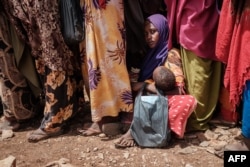The Global Network, an alliance of humanitarian and developmental agencies, says around 193 million people globally experienced extreme hunger last year, with more than half a million on the brink of famine in Ethiopia, southern Madagascar, South Sudan, and Yemen.
The network, which includes the European Union, U.N. Food and Agriculture Organization, and World Food Program, is calling for action to tackle the life-threatening crisis.
Authors of the report warn the crisis is set to worsen this year. They say the key drivers of food insecurity — conflict, climate change, and the COVID-19 pandemic — are pushing increasing numbers of people into poverty.
The executive director of the World Food Program, David Beasley, calls it a perfect storm. He says whatever progress has been made in feeding the destitute is being lost because of Afghanistan, Ethiopia, and now Ukraine.
"As we look around the world, 276 million people marching towards starvation," he said. "And now we have got the breadbasket of the world being turned into breadlines. Who would have ever thought that we would see this in our time, our lifetime. Mass migration taking place out of Ukraine. And it is going to devastate the food security situation around the world."
He notes Ukraine and Russia together produce 30 percent of the world's wheat, 20 percent of the world's maize, and up to 80 percent of sunflower seed oil. He says those supplies are not moving out of Ukraine because Russia has blockaded Black Sea ports.
"If we do not get ahead of this thing, we will have not just famine in multiple countries around the world because, you know, we got additional droughts and all types of issues. But you will have destabilization of some nations and you will have mass migration by necessity. And no one wants that," Beasley said.
UNICEF Executive Director Catherine Russell warns the global food crisis threatens child survival and development.
"By stark contrast, inadequate nutrition is the leading cause of child mortality," she said. "In fact, nearly half of all deaths of children under five are attributable to undernutrition. … We now estimate that by the end of 2021, 50 million children were suffering from wasting, the most life-threatening form of malnutrition. We expect this number is now higher."
The Global Network is calling for coordinated, collective action to address the food and nutrition crisis. It says emergency funding is needed now to pull starving people back from the brink, and longer-term action is crucial to create more sustainable agri-food systems.





